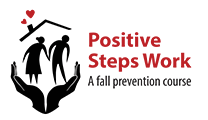
Healthy Aging
Healthy aging is about developing and maintaining the abilities that support wellness in older age. All people can experience healthy aging, despite individual health conditions that one may experience (WHO, 2020). Explore the ways you can support healthy aging.
Stay connected
Staying connected is important throughout our lives. Transitions that happen as we age such as retirement, or loss of a spouse can leave us feeling isolated. Having a variety of meaningful contacts keeps you socially connected. You may have friends that enjoy similar hobbies, or family you see regularly, or a close friend you talk with on the phone regularly. All of these can support your mental health.
| Tips for staying connected |
|
Engage in age-friendly communities
Age-friendly communities are those which “enable people of all ages to actively participate in community activities and treats everyone with respect regardless of their age. It is a place that makes it easy for older people to stay connected to people that are important to them. It helps people to stay healthy and active even at the oldest ages and provides supports to those who can no longer look after themselves.” (WHO, 2007)
Age-friendly communities are friendly for all!
Learn more about healthy communities and how to make a difference in your community.
Be active and eat healthy
Physical activity recommendations for older adults
- If you get at least two and a half hours of physical activity each week, you will be stronger, more flexible, and have better balance and coordination. This will help you prevent falls.
- For older adults, you want to really focus on strengthening muscles and bones and doing activities that improve your balance.
- It is never too late to get physically active. Your body can benefit from doing physical activity at any age. Find ways to get active that matches your abilities.
| Physical activity ideas |
Younger than 65? See the physical activity guidelines for adults for more information. 65 and older? See the physical activity guidelines for older adults for more information. Free, low-cost, and subsidized recreation to get you physically active! Did you know there are free fall prevention exercise programs throughout Durham Region? Find one near you!
|
Healthy eating is important throughout our life
As we get older, we experience changes such as decreasing muscle and bone loss. Also, our brain does not signal us to drink water when we are older like it did when we were younger.
| A few healthy eating tips to consider that will help to keep you healthy, strong, and free from falls |
Canada’s Food Guide for Seniors Are you an older adult? Get more information on healthy eating. |
Take care of your mental health
Mental health is about how you think, feel and act. We all have highs and lows in our mental health. Ageing can represent a time of many transitions such as children moving out of your home, retirement or the loss of family and friends. All these transitions can impact on your well-being. There are things you can do to take care of your mental health.
- Eat a healthy diet
- Be active
- Get enough sleep
- Find ways to manage and cope with your stress
- Stay connected to friends, family and community
| What is mental illness? |
|
A mental illness is when a person is diagnosed with a problem that alters their thinking, mood and/or behaviour. Examples of mental illness include depression and anxiety disorder. |
Connect to the programs and services you need for help to deal with a mental illness
Mental health crisis services A resource to support your mental health Mental health programs and services
Get immunized
Vaccines help to support or immune system as we age. There are certain vaccines that are important for older adults.
Adults in Ontario can get the following routine vaccines free:
- tetanus, diphtheria and pertussis (Tdap) once in adulthood, followed by tetanus and diphtheria (Td) every 10 years
- shingles vaccine (between 65 and 70 years old)
- pneumococcal 20 conjugate (Pneu-C-20), Prevnar 20 vaccine (age 65 and older)
- annual flu vaccine
You may need other vaccines based on your health status and lifestyle. Talk to your healthcare provider to review your vaccine options. Learn more about vaccine options for specific populations.
For more information see Public Health Agency of Canada - Not just for kids. An adult guide to vaccination
Learn to prevent falls
Falls are a serious health issue for all adults and may stop you from doing the things you want to such as working, cooking or even caring for yourself and family.
Falls for older adults can lead to:
- Longer hospitalization time
- Loss of your ability to move the way you use to
- Loss of independence and increased dependence on others to do things for you
- Social isolation
- Changes in living arrangements
As we age, a fall can have an even greater impact on your health and lifestyle. Eating healthy, keeping active, staying connected, safe medication use, understanding alcohol & cannabis, and keeping your home safe are ways in which we can reduce falls.
| Healthy ageing resources |
 If you are a care provider working with older adults, take our e-course to prevent falls and injuries for your clients or family members.
If you are a care provider working with older adults, take our e-course to prevent falls and injuries for your clients or family members.
| Know your medications |
Here are some tips to keep you safe with your medications:
If you have any questions about your medications, speak with your healthcare provider today. See the medication safety checklist from the Public Health Agency of Canada. |
| Keep your home and surroundings safe |
|
There are things you can do in and around your home to prevent a fall Inside your home:
Outside your home:
See the Guide to Home Safety for Older Adults for more information. |
Understand alcohol and cannabis
Alcohol
If you drink alcohol, it can make you less steady on your feet and make it more likely for you to slip, trip and fall. If you choose to drink, know what is a standard drink size.
Cannabis
Older adults are a group with a growing interest in cannabis use. It is important for you to understand the health effects of cannabis use.
Visit our Cannabis page for more information.
Visit the ConnexOntario website to find services and support for substance use.
Contact Us




